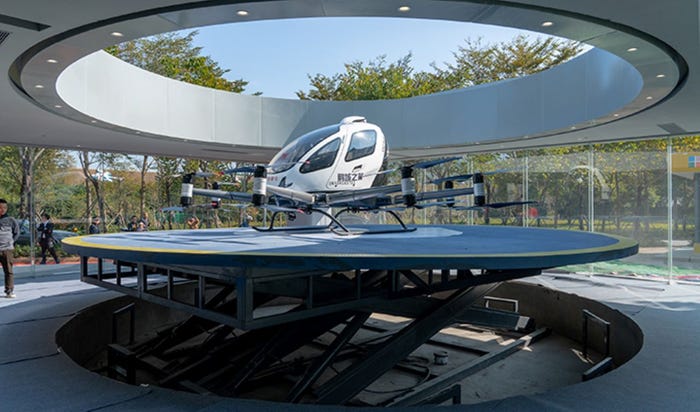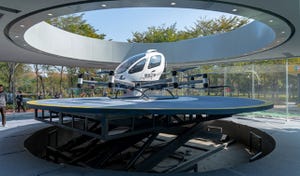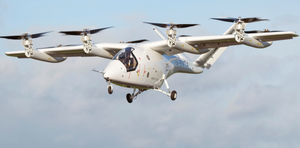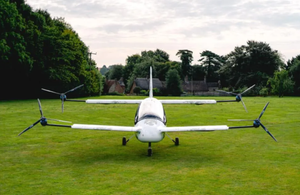Air Taxi Company Expands Platform in IndiaAir Taxi Company Expands Platform in India
The Eve Air technology serves air navigation service providers, urban authorities, fleet operators, vertiport operators

Air taxi company Eve Air Mobility has entered into an agreement with aircraft charter company JetSetGo to advance the use of Eve’s urban air traffic management (ATM) system in India.
The Eve Air urban ATM technology called Vector enables urban air mobility (UAM) to scale by serving air navigation service providers, urban authorities, fleet operators and vertiport operators.
The technology includes “flight coordination, vertiport automation, airside support, airspace flow management and conformance management,” according to the company.
“This agreement demonstrates Eve’s continued commitment to the Indian market, and we are looking forward to working with JetSetGo on urban air traffic management in India,” said Luiz Mauad, vice president, customer service at Eve Air Mobility. “With traffic congestion continuing to impact productivity in major cities, Urban Air Mobility has the potential to not only help address these issues but also connect regions outside of the city that do not have efficient access. Eve’s Urban ATM solution will play a critical role in helping to transport eVTOL passengers quickly and safely in densely populated cities in the future.”
Eve Air and JetSetGo plan to jointly promote urban air mobility in India and prepare the air space for travel alongside the production and certification of the eVTOL (electric vertical takeoff and landing) vehicles.
Eve Air recently signed a deal to sell 50 of its electric aerial vehicles (EAV) to Helicopters, Inc, which operates in metropolitan areas throughout the U.S.
For more flying vehicle and other emerging tech news subscribe to our free newsletter!
The purchase letter of intent was signed at the Revolution.aero advanced air mobility (AAM) conference, where Eve was participating.
Eve started working with Helicopters Inc. at a demonstration in Chicago in 2022.
The Eve eVTOL vehicle uses eight propellers for vertical flight and fixed wings to fly on cruise, with no change of component positions for flight. It has a range of 60 miles.
Eve Air has received $35 million in funding from the Brazil National Development Bank (BNDES).
That financing followed a $92.5 million line of credit secured in 2022 and a more recent $50 million investment from Citibank.
The funds are intended to support the eVTOL development program and for testing processes.
The Brazil bank already was a supporter of Eve’s vision for AAM.
As an important step for type certification, the National Civil Aviation Agency of Brazil (ANAC) recently published final airworthiness criteria for the Eve electric aerial vehicle (EAV).
Aside from funding issues, the development of electric flying vehicles is well underway.
For example, Eve Air introduced a full-scale eVTOL prototype at the Farnborough Airshow in the U.K. last year and completed the selection of the primary suppliers for its EAV prior to entering its testing phase.
The test phase includes flight capabilities and safety features for Eve, which has pre-orders for 2,900 of its electric flying vehicles, according to the company.
Eve Air funding includes a $94 million investment from several investors, including Embraer, the main backer of Eve Air, and a $20 million investment from Nidec Aerospace, the maker of its electric propulsion system. That investment is part of the Nidec strategy to supply products such as chargers for EAVs.
Eve Air also works with Embraer and Groupe ADP to prepare for EAV operations at Paris-Le Bourget Airport, including updating airport facilities by adding training, maintenance and ground services for eVTOL vehicles.
The company came out of Embraer’s business and innovation accelerator and has been working to create a low-sound vehicle with efficient thrust.
The Eve Air flying taxi is expected to enter service in 2026, with the company leveraging Embraer’s experience of developing, designing and certifying aircraft.
It is expected that Eve would use Embraer’s global network of service and support locations.
Eve Air also has an order for up to 50 of its EAVs from the largest helicopter air charter service in Japan as AirX Inc. signed a letter of intent to purchase 10 EAVs with an option to purchase 40 more and announced the launch of the Greater Tokyo Area’s first eVTOL test field, the urban air mobility center.
In addition to Japan, Eve is working with customers in Australia, India and South Korea.
Eve Air and UrbanX in Miami plan to launch eVTOL commuter flights throughout South Florida by 2026, when the first 10 Eve flying vehicles are planned for delivery.
GlobalX agreed to purchase 200 flying vehicles from Eve Air in 2022 and established UrbanX as a subsidiary of GlobalX.
The Florida flights are intended to help commuters navigate short distances and avoid traffic congestion and improve travel times.
Road travel times in Miami can be challenging because of delays caused by the frequent opening of numerous draw bridges as boats navigate through the many channels.
The electric flying service in Florida is subject to approvals from the Federal Aviation Administration (FAA) and Department of Transportation.
Eve Air also is growing arrangements with low-cost carriers, such as its deal with Flynas, a low-cost airline in Saudi Arabia, to explore starting eVTOL services in Riyadh and Jeddah.
Eve Air also has been working with cities, countries and regulatory authorities to establish concepts of operations in the U.S., Brazil and the U.K.
Read more about:
Flying CarsAbout the Author
You May Also Like







